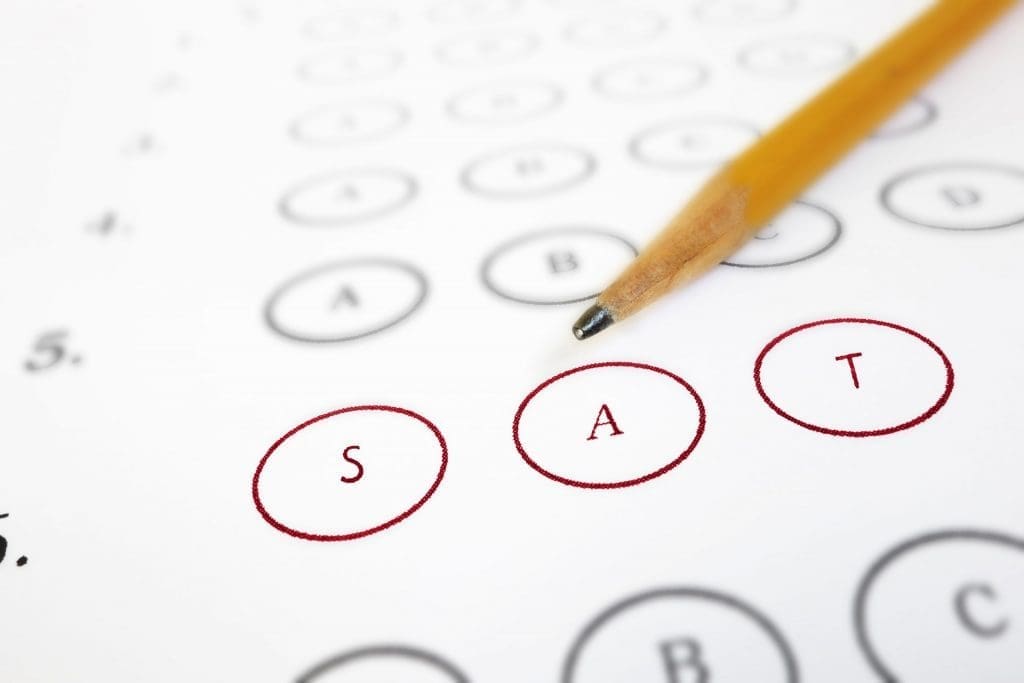Wondering whether you should take the ACT or the SAT before applying to college? You’re not alone. Because both of these benchmark academic tests are widely accepted by U.S. colleges and universities (sometimes interchangeably), many students are confused about which one they should pursue.
Of course, both exams serve roughly the same purpose: to demonstrate a student’s readiness for college. Although the structure and scoring of the tests vary, both test your critical thinking and analytical skills as a scholar.
It’s also important to emphasize that neither the SAT nor the ACT is inherently harder. That said, different students may do better on one test than the other. So why is that?
Understanding the differences between the ACT and the SAT will help you make this critical decision. Let’s find out how they compare.
Which test do universities prefer?
Most universities will not state a preference for either an SAT or ACT score. That’s because the most important factor for admissions decisions isn’t which test you took, but how high your score is.
Either way, you’ll want to make sure you get the best test results you can. This might involve taking the test multiple times to get increasingly good at it, thereby improving your score with each iteration.
Bottom line? Unless the admissions instructions for the university explicitly state a preference for ACT vs SAT or vice versa, it’s entirely up to you which test you choose to take.

Main differences between ACT vs SAT
If you’re looking for a foundational guide to test-taking in high school, download a copy of Empowerly’s Guide to High School Exams. This helpful introduction will give you the information you need to start off on the right foot.
Got all that? Let’s look at some of the key features of each of these tests, and then discuss their main differences.
ACT
Website: https://www.act.org/
- Exam duration: 2 hours 5 minutes (plus a 40-minute optional writing test)
- Number of exam questions: 171 plus an optional essay
- Exam components: 40-minute reading test, 35-minute English test, 50-minute math section, 40-minute science test, 40-minute writing test
- Use of a calculator during the math section: allowed
- Scored on a scale of 1-36
- Cost: $68 (no writing test), $93 (with writing test), $72 (with science test)
SAT
Website: https://satsuite.collegeboard.org/
- Exam duration: 2 hours 14 minutes
- Number of exam questions: 98
- Exam components: 64-minute reading and writing test, 70-minute math section
- Use of a calculator during the math section: allowed for one section, not allowed for another section
- Scored on a scale of 400 – 1600
- Cost: $60
Differences
As you can see, both tests take roughly the same amount of time to complete. The main difference would be if you added the optional writing test for the ACT, increasing the test time by 40 minutes. The SAT Reading and Writing section has reading passages that are short, with only one question per passage. On the other hand, the reading passages on the ACT are always long, with 10 questions each.
Some test takers say they prefer the pacing of the SAT vs the ACT. Because there are fewer questions on the SAT, test takers can spend more time on each one. Whether that extra time is helpful for you in a test setting is a personal preference.
You’ll also note that the ACT includes a science test, while the SAT does not. This might be of interest to students who do well in science, as it could make it easier for them to achieve a high score.
The costs of the exams are fairly similar, but are daunting for students with fewer financial means. You should check to see if you qualify for a fee waiver if cost is a barrier for you.
Lastly, each test has a different scoring scale. Universities will generally list their average incoming freshman ACT and SAT scores, so you’ll have an idea of the score you’ll need to be a competitive applicant.

Should you take both tests?
Some students prefer to take both tests. This could be for one of a few reasons; some think they will need both, depending on the university to which they are applying. But as we’ve mentioned earlier, the vast majority of U.S. colleges and universities will take either one and treat them equally.
Realistically? The likelihood that you will truly need both is low.
Other students like to take both and see which one gives them a better score. However, this is a time-consuming process, as both tests generally require a lot of preparation and studying to master.
You could spend double the time on both, or simply dedicate yourself to mastering one.
Deciding whether or not to take the optional ACT writing test
The ACT offers an optional 40-minute writing test. If you’re thinking about signing up for this portion of the exam, you’ll want to consider a few factors.
First, it costs an extra $25 to take the writing test. If you’re on a tight budget, you might not want to spring for something that’s optional.
Second, most colleges don’t require the essay as part of a student’s application, even if the student submits an ACT test score. You’ll want to check with your top colleges and universities to see if they require the optional writing test score along with the regular ACT score. If none of the schools to which you’ll be applying require it, you can feel comfortable skipping it.

How to study for the ACT or SAT
And speaking of ACT and SAT preparation, what are your options? Students generally assume that to get the best SAT test results or the best ACT test results, you need to sign up for the best SAT study programs or the best ACT study programs. But “best” can mean something different, depending on your study style, test-taking ability, and existing knowledge base.
At-home study
Lots of students go with the at-home study method. They get test prep materials either online or at their local library, and work through them on their own schedule. Maybe they will get together with a few other test-takers to talk through some of the sections, but they generally engage in independent test prep study.
In fact, one of the best ACT study programs just might be the official ACT test prep guide, which you can order for free from the makers of the ACT test. The owners of the SAT also provide some free SAT resources to help students prepare for the exam and get their best SAT test results.
Structured studying
Students who don’t do self-study well, or who need extra help in one or more of the exam subjects, should consider working with an ACT or SAT tutor. You could also enroll in a test prep class, where an instructor will guide you through the entire exam, helping you understand not only the material in the exam but also the pacing and rules.
Free resources
Of course, enrolling in a course or buying extra study materials might not be an option for everyone. It will depend on your available time and your budget. Thankfully, there is a treasure trove of free study materials available online and at your local library. The best ACT study programs (or SAT study programs) for any given student will vary.
What are the best SAT test results you can achieve?
A perfect score on the SAT is 1600. While not impossible to achieve, it is exceedingly rare. According to LinkedIn, roughly 0.07% of SAT exam takers get a perfect score. That’s only 7 out of 10,000 students. And it doesn’t even guarantee that you’ll land an acceptance letter from your top university, as the SAT score is only one part of the entire application package they will evaluate.
More important than trying for a perfect SAT score is making sure your score matches the averages of the universities you’d like to attend. An average or slightly above average score, combined with strong grades and other factors important to the university, is how you leverage your best SAT test results into improving your chances of getting in.
Meanwhile, a perfect score on the ACT is 36, and it is also exceedingly rare. In 2020, 0.33% of ACT test takers got a perfect score – or 5,579 out of more than 1.6 million students. Again, more important than acing the test is making sure your score matches or exceeds the average score accepted by the universities of your choice.
ACT vs SAT: the bottom line
You don’t need to spend too much time wondering whether you should take the ACT or the SAT before applying to college.
Both tests are widely accepted by U.S. colleges and universities because both exams serve roughly the same purpose: to demonstrate a student’s readiness for college. Both the ACT and SAT will test your critical thinking and analytical skills, and your resulting score will still represent just one aspect of your overall application package.
So, unless the admissions instructions for the university explicitly state a preference for ACT vs SAT or vice versa, it’s entirely up to you which test you choose to take.
Whichever test you choose, be sure to prepare for it in a way that matches your current knowledge and study style. For some students, this will be self-study using free resources you can find online or by purchasing study prep materials at the bookstore. Other students will prefer (or need) more intensive test prep, through a tutor or test prep class. Consider your needs and your budget when making these decisions.
In the end, your main focus should be ensuring your test score matches or exceeds the average score of incoming students at your universities and colleges of choice.
Need support on your testing journey? Reach out to Empowerly. We have tried-and-tested strategies to help you boost your scores. Book your free consultation to learn more about our team.
Originally published September 09, 2023. Updated October 27, 2025.
